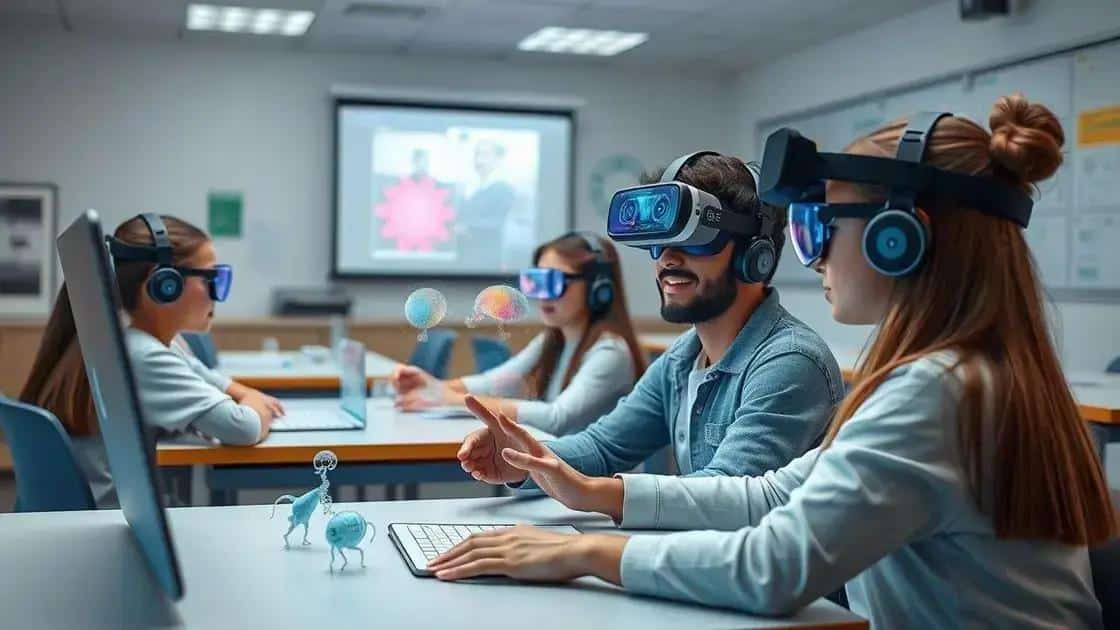Insights on ai tutoring programs for student success

AI tutoring solutions enhance personalized learning by adapting to individual students’ needs, integrating emotional recognition, and utilizing advanced technologies like augmented reality for immersive educational experiences.
Insights on ai tutoring programs are changing the landscape of education, offering tailored learning experiences that cater to individual student needs. Have you considered how these innovations can enhance learning for your kids?
Understanding the role of ai in tutoring programs
Understanding the role of AI in tutoring programs is essential as we embrace new educational technologies. These tools enhance personalized learning, enabling students to grasp concepts better and faster.
Key Functions of AI in Tutoring
AI-driven tutoring programs offer various functions that transform traditional learning environments. By analyzing student performance, these tools can adjust to individual needs seamlessly.
- Real-time feedback: AI provides immediate insights, helping students understand their mistakes and improve.
- Personalized learning paths: Each student receives a unique curriculum based on their strengths and weaknesses.
- Engagement enhancement: Platforms use gamification to make learning fun and motivating.
Moreover, AI can identify learning patterns that may not be obvious to teachers. By harnessing algorithms, AI systems assist in crafting lessons that cater directly to students’ requirements. This ensures that learners are neither bored with too easy tasks nor overwhelmed by complex challenges.
Impact on Educators
AI doesn’t replace teachers; instead, it equips them with tools to enhance efficiency. Educators can focus more on guiding students rather than managing administrative tasks. This allows for a more interactive learning experience, as teachers spend time on evolving student comprehension.
As we delve deeper into AI’s capabilities, we see a shift towards a more collaborative approach in education. Tutors and educators can work alongside AI to craft lessons and strategies tailored to student needs.
Understanding the role of AI in tutoring programs highlights not only the changes occurring in classrooms but also the possibilities for making learning accessible and enjoyable for all students. With its ongoing development, the future of intelligent tutoring systems looks promising and ripe with potential for enhancing academic success.
Benefits of implementing ai tutoring for students

Implementing AI tutoring brings significant benefits for students, transforming the learning experience in numerous ways. These advantages range from personalized learning to improved engagement.
Personalized Learning Experience
With AI tutoring, students receive lessons that cater specifically to their needs. The technology adjusts to individual learning paces, ensuring that no student is left behind. This personalized approach helps build confidence and encourages a deeper understanding of the subject matter.
- Customized feedback: Students get targeted feedback that helps them improve effectively.
- Adaptive learning paths: Lessons change based on performance, keeping students challenged yet supported.
- Focus on strengths and weaknesses: AI identifies what students excel in and where they need extra help.
Additionally, students can engage with content at their own pace. This flexibility allows them to revisit concepts that are challenging, enhancing retention by creating a solid foundation.
Increased Engagement and Motivation
Another key benefit of AI tutoring is increased student engagement. By incorporating interactive and gamified elements, these platforms capture students’ attention more effectively than traditional methods.
As students interact with the software, they become more involved in their learning journey. This interactivity can lead to better retention rates and a positive attitude toward education. Gamification often turns learning into a fun challenge, motivating students to achieve their goals.
Moreover, the use of AI allows for continuous assessments without the stress usually associated with tests. Frequent, low-pressure evaluations help reduce anxiety, leading to academically healthier student experiences.
As students recognize their progress through instant feedback, they gain a sense of accomplishment. This boosts self-esteem and reinforces their desire to learn.
Best practices for using ai in educational settings
Using AI in educational settings can significantly enhance learning experiences when implemented effectively. Various best practices can help educators maximize the benefits of these advanced technologies.
Integrating AI Seamlessly
It’s crucial to integrate AI tools seamlessly into existing curricula. Educators should not treat AI as just an add-on but as a core component of the learning environment. This integration requires collaboration between teachers and tech developers to ensure that tools meet students’ needs.
- Choose user-friendly platforms that require minimal training.
- Align AI tools with specific educational goals to provide focused learning.
- Gather feedback from students to understand their experiences and adjust accordingly.
Additionally, incorporating AI into classroom activities should involve students actively. Encouraging their participation helps them become familiar with technology while benefiting from its use.
Continuous Training for Educators
To effectively use AI, teachers must receive ongoing training. Professional development sessions can equip educators with the knowledge and skills to optimize technology in their lessons.
Educators who understand how to use AI tutoring tools can provide better guidance to their students. This ongoing support ensures that teachers remain confident in using new technologies and can adapt swiftly as innovations arise.
Furthermore, sharing experiences and strategies among educators fosters a collaborative environment. Teachers can learn from each other’s successes and challenges, enriching their teaching practices.
Best practices also include regularly assessing the effectiveness of AI tools. Evaluating their impact on student learning allows educators to refine their approaches and make necessary adjustments. By being adaptable, teachers can ensure that the technology remains beneficial and relevant.
Future trends in ai tutoring solutions

Future trends in AI tutoring solutions are shaping the educational landscape, promising even more personalized and efficient learning experiences. As technology evolves, so will the capabilities of AI in helping students achieve their academic goals.
Advanced Personalization
One significant trend is the move towards advanced personalization. Future AI tutoring systems will analyze not just performance data but also emotional and social factors that affect learning. This will allow programs to create a more holistic approach to education.
- Emotional recognition: Systems will be able to gauge students’ moods and adjust lesson plans accordingly.
- Social learning integration: AI will facilitate collaborative learning experiences among groups, adapting to their dynamic interactions.
- Enhanced feedback mechanisms: Students will receive even more tailored responses to their queries and learning behavior.
By leveraging machine learning algorithms, these solutions will continually adapt to each student’s evolving needs, making education more responsive and engaging.
Integration with Augmented Reality (AR)
Another exciting trend is the integration of AI tutoring with augmented reality (AR) technology. AR can create immersive learning environments that enhance engagement and retention.
Imagine students interacting with 3D models of complex concepts during their lessons. This kind of innovative approach enables much deeper exploration of subjects, from science to history. Such experiences facilitate better understanding and retention of information.
Educational institutions could offer virtual field trips or interactive problem-solving scenarios that make learning come alive. By combining AI and AR, students can enjoy a captivating learning experience that traditional classrooms cannot provide.
As we anticipate these trends, it is evident that the future of AI tutoring solutions will focus on creating smarter, more intuitive learning environments. This transformation promotes not only academic success but also nurtures lifelong learning skills.
AI tutoring solutions is bright and exciting. With personalized experiences and advanced technology, students are set to benefit immensely. As AI continues to evolve, it will create engaging and effective learning environments. Educators will play a crucial role in integrating these tools into everyday teaching. Ultimately, the goal is to help all students achieve academic success while fostering lifelong learning skills.
FAQ – Frequently Asked Questions about AI Tutoring Solutions
What are the main benefits of AI tutoring?
AI tutoring provides personalized learning experiences, immediate feedback, and adaptable learning paths, all of which enhance student engagement and understanding.
How does AI help in understanding student emotions?
AI systems can analyze student interactions and performance to gauge emotional responses, allowing for adjustments that better support learners’ needs.
Can AI tutoring solutions integrate with existing educational tools?
Yes, many AI tutoring platforms are designed to integrate seamlessly with traditional educational tools and curricula, enhancing their effectiveness.
What role do teachers play in using AI tutoring systems?
Teachers are essential in guiding the use of AI tools, providing context, and helping students interact effectively with the technology for maximum benefit.





